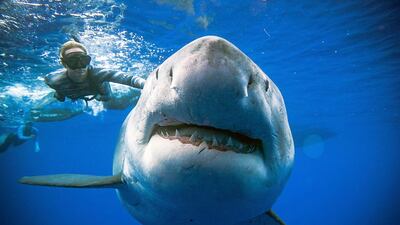There is a nervousness on Cape Cod, a hooked shaped peninsula in Massachusetts in the north east of the US, as it prepares to welcome millions of tourists over the summer, following a fatal shark attack last September.
Arthur Medici, 26, was the first person to be killed by a shark off the Cape since 1936.
Only weeks earlier another holidaymaker, William Lytton, a neurologist from Scarsdale, New York, was badly injured by a shark that sank its teeth into his thigh.
He needed six operations and even then still lost a substantial amount of muscle from his leg.
Now Massachusetts is investing heavily to make sure the Cape is "shark prepared" this summer, rather than risk another incident which would have a devastating impact on the economically vital tourist industry.
With its picturesque towns and abundant sandy beaches, Cape Cod welcomed nearly four million people last year who, according to one estimate, spent around $1 billion (Dh3.67 bn).
Unfortunately for the tourist industry, the number of great white sharks is on the rise as well.
Last July Greg Skomal, a marine biologist in Massachusetts, said his research team had spotted 149 – more than double the 74 seen in the previous year.
The consensus is that shark population growth has been driven by the abundance of grey seals in the region.
According to the latest estimate, there are at least 50,000 seals in Cape Cod. Their numbers have soared since the passage of the Marine Mammal Protection Act in 1972.
While the legislation has rescued the seals from the brink of extinction, it has also provided plentiful food for sharks, which have been drawn to the Cape to hunt their favourite prey.
Prior to the Act, there was a bounty on seals, with hunters being paid $5 if they presented a nose to the authorities, because fishermen feared they were devouring the cod on which their livelihoods depended.
"The moratorium on culling seals has allowed that population to rebound," said Bryan Legare, a marine biologist with the Centre for Coastal Studies.
"Protection was put in place for the great white sharks in the 1990s and taking the pressure off has allowed that population to rebound as well."
The rise in the seal population, already blamed for the decline of the cod fishing industry in the Cape, is now threatening the region's other major money-spinner, tourism.
Given the sharp rise in the shark population, action was needed.
Via its Executive Office of Public Safety, Massachusetts announced it was investing $383,000 (Dh1.4 m) to deal with the problem.
The grant will be shared by six towns on the Atlantic Ocean: Truro, Eastham, Wellfleet, Chatham, Orleans and Provincetown.
Perhaps hoping not to put off tourists visiting the Cape this summer, the press release announcing this initiative avoided using the word "shark".
Massachusetts chose a rather more anodyne term – the funds are for "municipal preparedness and response programmes."
The money is being used to pay for emergency telephone boxes in areas where the mobile signal is weak; all-terrain vehicles to speed getting help to where it's needed; satellite phones for lifeguards; and specialised medical equipment.
"We are doing what we can at this point to increase the availability of communication in remote locations and enhancing our emergency response," said Suzanne Thomas, the director of community services at Wellfleet.
"We have no way of protecting people 100 per cent from sharks. What we can do is educate them about how the ocean works… If there was something which would give us 100 per cent protection against sharks we would have done it."
But some question whether the response has been adequate.
"The seals are protected, the sharks are protected but recreational water areas aren't," said Marc Angelillo, a lifelong surfer from Orleans.
"Measures on land to deal with a shark attack do not go far enough," he said. "Technology is available which would track sharks and, in some cases, product is out there now to deter them.
"We have seen enough research. They have been talking and collecting info for about five years now, we are in desperate need to have something in place for all Cape Cod recreational ocean areas."
Some officials on the Cape were reluctant even to discuss the shark issue publicly, fearing that it would generate unwanted adverse publicity.
But Mr Angelillo is among those who want the problem aired publicly and urgent action to be taken.
"What we are talking about is another life-threatening, life-altering catastrophe situation going to happen very soon.
"Unfortunately, next time the victim could be somebody local or from our community."

